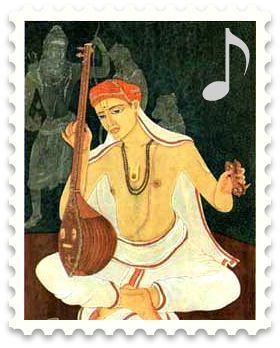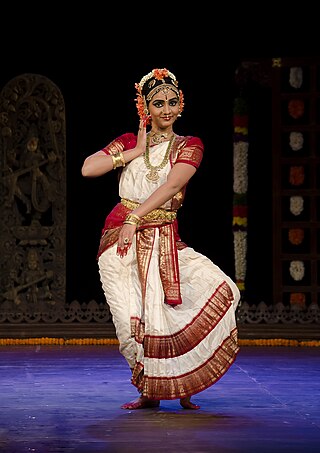Related Research Articles

Carnatic music or Karnataka Sangita is a system of music commonly associated with South India, including the modern Indian states of Andhra Pradesh, Karnataka, Kerala, Tamil Nadu and portions of east and south Telangana and southern Odisha.

Sadguru Tyagaraja Swami, also known as Tyagayya, and in full as Kakarla Tyagabrahmam, was a saint and composer of Carnatic music, a form of Indian classical music. Tyagaraja and his contemporaries, Shyama Shastri and Muthuswami Dikshitar, are regarded as the Trinity of Carnatic music. Tyagaraja composed thousands of devotional compositions, most in Telugu and in praise of Rama, many of which remain popular today. However, only 720 of these are in vogue. Of special mention are five of his compositions called the Pancharatna Kritis, which are often sung in programs in his honour. Tyagaraja composed Utsava Sampradaya Krithis, which are often sung to accompany temple rituals and Divya Nama Sankeertanas which are sung as a part of concerts and in daily life.

Indian classical music is the classical music of the Indian subcontinent. It is generally described using terms like Shastriya Sangeet and Marg Sangeet. It has two major traditions: the North Indian classical music known as Hindustani and the South Indian expression known as Carnatic. These traditions were not distinct until about the 15th century. During the period of Mughal rule of the Indian subcontinent, the traditions separated and evolved into distinct forms. Hindustani music emphasizes improvisation and exploration of all aspects of a raga, while Carnatic performances tend to be short composition-based. However, the two systems continue to have more common features than differences. Another unique classical music tradition from the eastern part of India is Odissi music, which has evolved over the last two thousand years.

Mangalampalli Balamuralikrishna was an Indian Carnatic vocalist, musician, multi-instrumentalist, playback singer, composer, and character actor. He was awarded the Madras Music Academy's Sangeetha Kalanidhi in 1978. He has garnered two National Film Awards, the Sangeet Natak Akademi Award in 1975, the Padma Vibhushan, India's second-highest civilian honor in 1991, for his contribution towards arts, the Mahatma Gandhi Silver Medal from UNESCO in 1995, the Chevalier of the Ordre des Arts et des Lettres by the French Government in 2005, the Sangeetha Kalanidhi by Madras Music Academy, and the Sangeetha Kalasikhamani in 1991, by the Fine Arts Society, Chennai to name a few.

Kuchipudi is one of the eight major Indian classical dances. It originates from a village named Kuchipudi in the Indian state of Andhra Pradesh. Kuchipudi is a dance-drama performance, with its roots in the ancient Hindu Sanskrit text of Natya Shastra. It developed as a religious art linked to traveling bards, temples and spiritual beliefs, like all major classical dances of India.

Hanumatodi, more popularly known as Todi, is a rāgam in Carnatic music. It is the 8th melakarta rāgam in the 72 melakarta rāgam system. This is sung very often in concerts. It is a difficult rāgam to perform in owing to its complexity in prayoga. It is called Janatodi in Muthuswami Dikshitar school of Carnatic music. Its Western equivalent is the Phrygian mode. Todi in Carnatic music is different from Todi (thaat) of Hindustani music. The equivalent of the Hindustani raga Todi in Carnatic music is Shubhapantuvarali. The equivalent of Carnatic Todi in Hindustani is Bhairavi thaat in terms of notes, but the two sound very different due to differing uses of gamakas.

Lalgudi Gopala Iyer Jayaraman was an Indian Carnatic violinist, vocalist and composer. He is commonly grouped with M.S. Gopalakrishnan and T.N.Krishnan as part of the violin trinity of Carnatic music. He was awarded the Padma Bhushan by the Government of India in 2001.

Oothukkaadu Venkata Kavi or Oottukkaadu Venkata Subramanyar was one of the pioneering composers in Indian classical Carnatic music. He lived in South India in the present-day state of Tamil Nadu. Also known by the name Oothukkaadu Venkatasubramaniya Iyer, he composed hundreds of compositions in Sanskrit and Tamil of which over 500 are available. These were handed down from generation to generation by the descendants of the composer's brother's family.

Narayana Teertha was a Hindu saint and composer, known to be a devotee of the deity Krishna.

Madras Lalithangi Vasanthakumari was a Carnatic musician and playback singer for film songs in many Indian languages. MLV and her contemporaries, D. K. Pattammal and M. S. Subbulakshmi, are popularly referred to as the female trinity of Carnatic music. A prime disciple of G. N. Balasubramaniam, she was the youngest among the established musicians of that era and was the youngest female to receive the Sangita Kalanidhi award. In 1967, she was honored with the Padma Bhushan, the third highest civilian award, by the government of India. Her daughter, the late K. Srividya, was an actress in Tamil and Malayalam.

"Bombay" Jayashri Ramnath is an Indian Carnatic vocalist, singer, and musician. She has sung songs in multiple languages, including for Tamil, Telugu, Kannada, Malayalam, and Hindi movies. Born into a family of musicians, Jayashri represents the fourth generation of music practitioners in her family. Trained by Lalgudi Jayaraman and T.R. Balamani. She was awarded India's fourth highest civilian award, the Padma Shri, in 2021. In December 2023, she was awarded the most prestigious award in the Carnatic music field, the Sangeetha Kalanidhi, by the Madras Music Academy. She was nominated for an Academy Award for Best Original Song (Oscar) for Pi's Lullaby from Life of Pi movie. She has become one of the most sought-after Carnatic musicians today.

Ranjani and Gayatri are two sisters who perform as a Carnatic vocal and violin duo. They have also appeared as soloists, accompanists, composers, and educators of Indian Classical Music. Their work includes studio recordings; television, radio, and festival appearances; live concerts; and lecture demonstrations.

Charulatha Mani is a celebrated Indian-born Australian Carnatic and playback singer. She has been performing Carnatic concerts since 1999. She has also sung chartbusters for Tamil, Telugu and Hindi movies. Charulatha has appeared in numerous TV shows and radio programmes, in India, and overseas. She has recorded many, CD and DVD albums. Her Isai Payanam TV show, aired on Jaya TV, deals with Ragas in Carnatic and film music and has completed more than 80 episodes. She recently received her PhD from the prestigious Queensland Conservatorium Griffith University, Brisbane, Australia, on Hybridising carnatic Music and Early Opera. Charu's music is known for its impeccable adherence to the Karnatik principles. It is also known for being courageous and highly creative. It is this ongoing interplay, of newness and the vintage, that has become the hallmark of her unique performance philosophy and signature style. This interesting interweave derives from her strong belief that Karnatik music must embrace innovation, inclusivity and diversity in contemporary society.
Kudamaloor Janardanan[കുടമാളൂര് ജനാര്ദ്ദനന്] is an Indian flautist of the Carnatic music tradition.
Paul Poovathingal, popularly known as the 'Padum Pathiri' or 'singing priest of India', is a carnatic music vocalist, composer and lyricist and is the first vocologist in India. He is an ordained priest in the religious congregation of the Carmelites of Mary Immaculate (CMI). He has composed around 1000 songs and released 35 music albums. He is a disciple of the legendary Carnatic musician and playback singer Padmabhushan K. J. Yesudas and of Chandramana Narayan Namboothiri. He is the first Indian Christian priest in the world to earn PhD in Carnatic music. He has performed classical music before A.P.J. Abdul Kalam, President of India and before Bharat Ratna M.S. Subbulakshmi.

Sri Krishna Leela Tarangini is a tarangini or a Sanskrit opera authored by Narayana Teertha. The songs are in chaste Sanskrit and clear diction and are rich in poetic quality. Tarangini is an opera highly suitable for dance drama and it has been very well utilized by Indian classical dancers over the last two centuries. Tarangini consists of 12 Tarangams and encapsulates 153 songs, 302 slokams and 31 choornikaas. Teertha followed Veda Vyasa’s Bhagavatam and concentrated on the 10th skandam.
Ramesh Vinayakam is an Indian composer, arranger, singer, songwriter, music producer, story writer and a music researcher.

Saraswati Vidyardhi is a Carnatic vocalist and composer from Andhra Pradesh, India. She has won critical acclaim for her intensive research in Anumandra sthai (octave). She is capable of singing notes below the mandra shadjam up to the anumandra shadjam, and has also unearthed rare Panchamantya ragas.
Malladi Suribabu is an Indian Carnatic vocalist and musician from Vijayawada, India. He was conferred with Kala Ratna, a civilian honor by the Government of Andhra Pradesh in 2013 and TTK Award by Madras Music Academy in 2014. He is a disciple of Voleti Venkateshwarulu, Sripada Pinakapani and Nedunuri Krishnamurthy.
References
- ↑ "Grand music fete today". The Hindu . 2 April 2007. Archived from the original on 28 June 2007. Retrieved 9 February 2012.
- ↑ "Honour for devotional music". The Hindu . 8 May 2006. Archived from the original on 11 April 2009. Retrieved 9 February 2012.
- ↑ G. Srinivasan (2 September 2010). "Musical programmes pervade Gokulashtami celebrations". The Hindu . Archived from the original on 13 April 2011. Retrieved 9 February 2012.